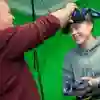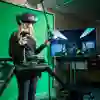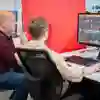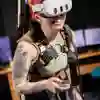




This exciting new Masters programme will ready you for a career using some of the world’s most exciting technologies.
Covering virtual and augmented realities as well as mixed realities, you’ll work on your own and in groups on cutting-edge software to push boundaries and create immersive user experiences, supported by expert teaching on how to apply human factors to your creative concepts.
Designed specifically to plug industry skills gaps, you’ll develop technical and personal skills plus a portfolio to put you in pole position for future roles in the dynamic field of immersive design.
About this course
Whether you have your eye on a career in gaming or can see the huge potential of mixed (MR), virtual (VR) and augmented (AR) reality in different industries, use this course to equip yourself with skills to catapult you into your dream role.
Blending the practical and theoretical, you’ll work on projects to develop game engine tools and framework skills. We’ll teach you how to build in human factors including immersive user experience considerations in 360o design. And you’ll learn how to develop immersive audio techniques along with 3D and design workflows.
Collaborate and learn critical project management skills as you design and develop your concepts. Build a portfolio by working on challenging projects then deliver a substantial final immersive project.
You’ll solve complex, real-world problems using our state-of-the-art equipment, Media Lab, and game engine partnerships.
What are you waiting for? Step into our world.

MA Immersive Design in XR
2 mins
Module options
For a full Masters degree, you'll study 180 credits over the duration of your course. Some programmes offer a Postgraduate Diploma (PGDip) qualification or a Postgraduate Certificate (PGCert) qualification. For a PGDip, you'll study 120 credits, and for a PGCert, you'll study 60 credits.
Filters
Immersive Technologies and Platforms
This module will introduce the metaverse landscape and discuss the human factors of immersive design. You will explore the applications of real time game engine-related tools, evaluate and learn a range of tools that will facilitate the creation of interactive immersive experiences with economy and rapidity. You will be introduced to the importance of the user experience and design problem-solving techniques to be used within the remaining modules.
core
30 credits
Immersive Audio-Visual Design
Gain an understanding of underlying design principles and concepts with an introduction to foundational technical and creative skills that will underpin the development of your immersive design portfolio. This module has been designed in collaboration with leading industry practitioners, ensuring its currency and industry relevance.
core
30 credits
Designing for Virtual Reality
Extend your knowledge of game engines, to design and deploy virtual reality projects. Real VR projects, including entertainment, industry workflows and games beyond entertainment, will be used to inform you of the growing design landscape.
core
30 credits
Designing for Augmented and Mixed Reality
Research and design effective augmented and mixed reality projects by exploring real Augmented Reality and Mixed Reality projects from a range of disciplines.
core
30 credits
Project Based Module (Immersive Design)
Working independently or as part of a group, you will conduct your own research to design and develop a substantive immersive experience or game.
core
60 credits
Our academics
Study under experts who’ve worked on BAFTA-winning games and titles for names like Disney and Lucasfilm.
You’ll be taught by enthusiastic, expert staff who are fans of their field as much as they are academics. Our lecturers have a diverse range of industry experience, including digital media and game design.

Jason Hayhurst
Senior Lecturer in Digital Media
Jason has significant experience within industry and academia in translating user requirements into effective design solutions. He is passionate about the appropriate use of technology and design to effect positive change in behaviour.

Professor Yang Jiang
Programme Director & Lecturer
Yang is a Professor of Immersive Design in the School of Arts, Faculty of Arts Cultures and Education. She is a fellow of HEA, a member of the AHRC Peer Review College and AdvancedHE Aurora Women Leader.
Entry Requirements
What do I need?
When it comes to applying for this Postgraduate Taught degree, you'll need an Undergraduate degree (or equivalent). For this course, you'll need a 2:2 from a relevant bachelor's degree.
The programme is designed for graduates who have a studied a subject that is relevant to this course.
If you’re an undergraduate student at Hull, you’re guaranteed a fast-track route to this postgraduate degree, as long as you meet the entry requirements.
In order to ensure our students have a rich learning and student experience, most of our programmes have a mix of domestic and international students. We reserve the right to close applications early to either group if application volumes suggest that this blend cannot be achieved.
Typical offer
2:2 in a relevant subject area
Applicants should hold a 2.2 Honours degree in relevant subject area.
Fees & Funding
How much is it?
Tuition fees for 2027 entry have not been confirmed. Please use 2026-27 information as a guide.
Scholarships
We offer a number of awards, bursaries and scholarships for eligible students. They’re awarded for a variety of reasons including academic achievement and/or to help those on lower incomes.
Scholarships and bursaries are separate to student loans. And the best bit is, you don’t pay a penny back.
Alumni Postgraduate Scholarship
University of Hull undergraduates progressing to a taught masters course may receive a 20% discount on the cost of their tuition fees.
Find out if you’re eligible by visiting the University of Hull Alumni Postgraduate Scholarship page.
See more Scholarships
We offer a range of scholarships and awards to students at the university to help with their financial load.
To view all of our scholarships and determine whether you're eligible, please visit our Scholarships and Awards page.
Our facilities




Future prospects
Immersive technology is transforming the way we engage with the world. Industry research estimates the immersive economy will enhance more than 400,000 jobs by 2030, adding £62.5billion to the UK economy.
This programme will enable you to translate your learning into practical projects and a sophisticated portfolio of work based on real-life problems. You will be able to apply your skills and knowledge across a wide range of roles and industries, including:
- Designer or UX designer
- Creative director
- Technical artist
- Post-production editor
- Programmer or developer
Take your career to the next level
Like what you've seen? Then it's time to apply.
Make your application online now, and our admissions team will get back to you as soon as possible to make you an offer.
Not ready to apply yet?
We regularly deliver virtual and on-campus events to help you discover your perfect postgraduate course, whether it’s a subject you already love or something completely different. Our events are an opportunity for you to chat to tutors and current students and find out about the career options a postgraduate degree could lead to.
You may also be interested in...
All modules on this course page are subject to availability and this list may change at any time.